Valerian root pairs exceptionally well with several herbs to enhance its sleep-promoting effects. You'll find chamomile and lavender are popular companions, offering calming properties that complement valerian's sedative action. Lemon balm and passionflower can boost valerian's anxiolytic effects, helping you relax more deeply. Hops and catnip provide additional mild sedative properties, while linden flower contributes its own relaxing qualities. For mood balance, St. John's Wort can be a valuable addition, and kava root offers deep relaxation benefits. Each combination targets different aspects of sleep, from reducing anxiety to improving overall sleep quality. Exploring these pairings can reveal the key to your best night's rest.
Chamomile and Valerian Root Synergy
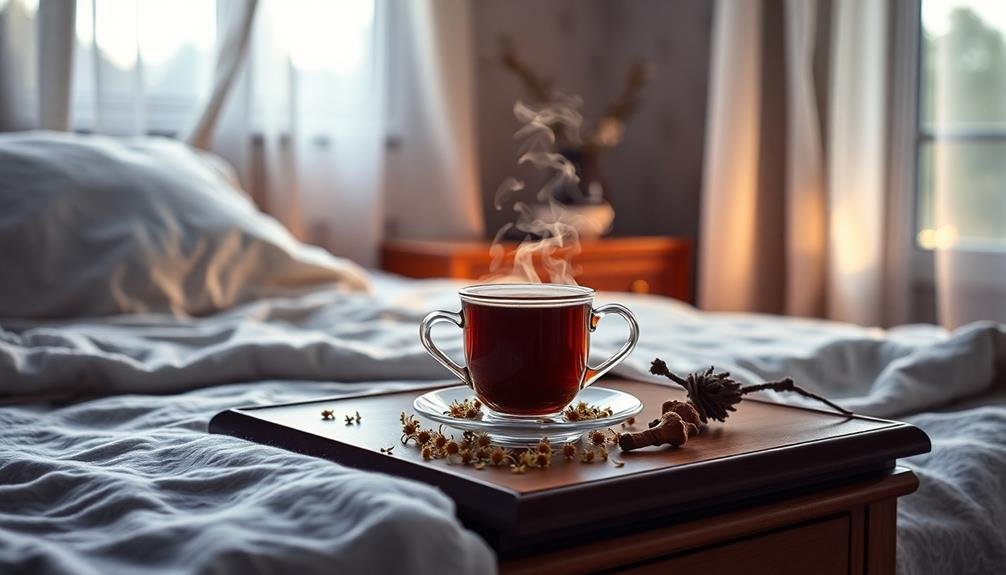
Chamomile and valerian root make a potent herbal duo for improving sleep quality. These two herbs complement each other well, enhancing their individual sleep-promoting properties when combined.
Chamomile is known for its calming effects, helping to reduce anxiety and promote relaxation. Valerian root, on the other hand, acts as a natural sedative, potentially shortening the time it takes to fall asleep.
When you combine these herbs, you'll benefit from chamomile's ability to soothe your mind while valerian root helps your body prepare for sleep. This synergy can lead to a more restful night, as you're addressing both mental and physical aspects of sleep.
You can find pre-made tea blends containing both herbs or create your own mixture. To maximize the benefits, steep 1-2 teaspoons of dried chamomile flowers and 1-2 teaspoons of valerian root in hot water for 10-15 minutes. Drink this tea about an hour before bedtime.
Remember that while these herbs are generally safe, it's always wise to consult with a healthcare professional before adding new supplements to your routine, especially if you're taking medications or have existing health conditions.
Lavender's Calming Effect With Valerian
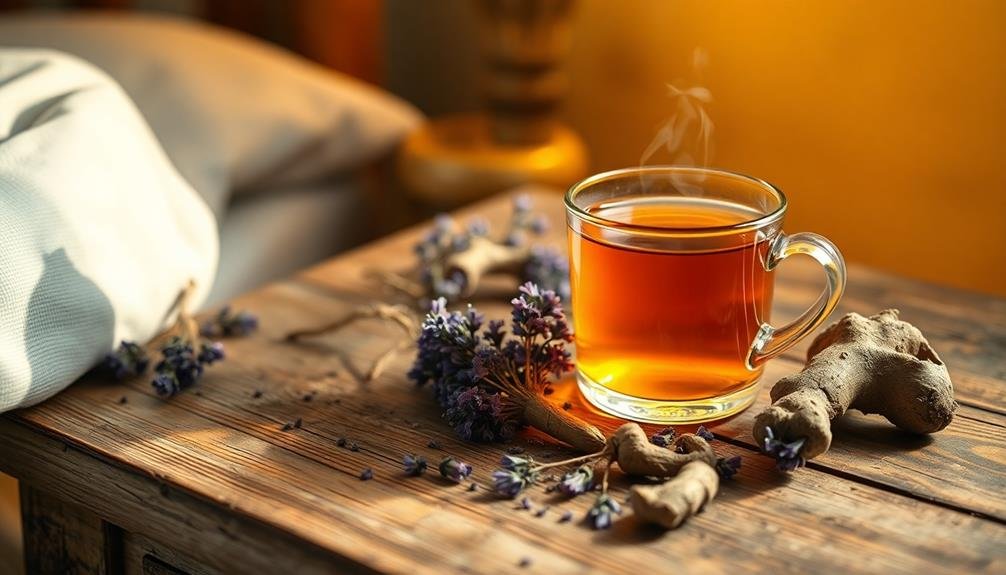
While chamomile and valerian root make an excellent team, another powerful herb that pairs well with valerian is lavender. You'll find that lavender's calming properties complement valerian's sedative effects, creating a potent combination for improved sleep quality.
Lavender contains linalool, a compound known for its anxiety-reducing properties. When combined with valerian, it can help you relax both mentally and physically before bedtime. This synergy may lead to faster sleep onset and deeper, more restorative sleep throughout the night.
You can incorporate this pairing into your nighttime routine in several ways. Try drinking a tea blend of valerian root and lavender flowers, or use lavender essential oil in a diffuser while taking a valerian supplement.
Some people prefer to combine valerian capsules with lavender-infused pillows or eye masks for a multi-sensory approach to relaxation.
It's important to note that while this combination is generally safe, you should start with low doses and consult your healthcare provider, especially if you're taking other medications or have existing health conditions.
Lemon Balm for Anxiolytic Properties
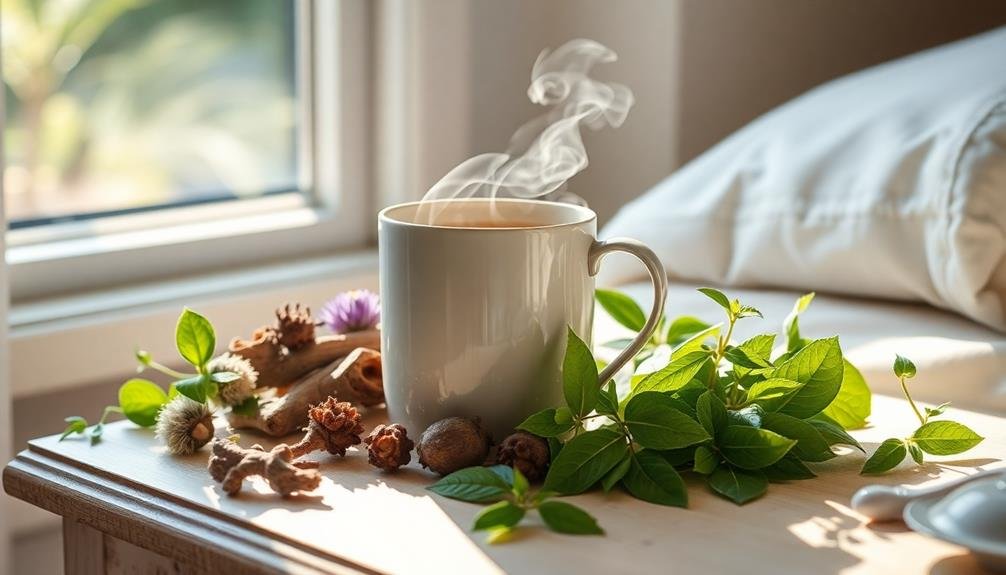
Lemon balm's anxiolytic properties complement valerian root's sedative effects, creating a powerful calming synergy.
You'll find that both herbs modulate GABA receptors, enhancing their stress-reducing benefits when used together.
This combination can help you manage anxiety and improve sleep quality more effectively than either herb alone.
Calming Effect Synergy
Many herbalists recommend combining valerian with lemon balm for enhanced relaxation. This pairing creates a synergistic effect that can amplify the calming properties of both herbs. When you use these two together, you're likely to experience a more potent sedative effect than if you were to use either herb alone.
The combination works by targeting different aspects of your nervous system. Valerian primarily acts on GABA receptors, promoting a sense of tranquility and easing you into sleep. Lemon balm, on the other hand, has been shown to reduce anxiety and stress by influencing serotonin and dopamine levels. Together, they create a thorough approach to relaxation.
You'll find that this herbal duo can help you unwind more quickly and achieve a deeper, more restful sleep. The synergy between valerian and lemon balm may also help reduce the dosage needed of each herb, potentially minimizing any side effects.
For best results, you can try taking them as a tea, tincture, or in capsule form about an hour before bedtime. Remember to consult with a healthcare professional before adding any new herbal supplements to your routine.
GABA Receptor Modulation
Building on the synergistic effects of valerian and lemon balm, it's important to understand how lemon balm specifically impacts GABA receptors. Lemon balm enhances the calming effects of valerian by modulating GABA receptors in your brain. This herb contains compounds that bind to GABA receptors, increasing the effectiveness of this inhibitory neurotransmitter.
When you combine lemon balm with valerian, you're targeting the GABA system from multiple angles. Valerian increases GABA levels, while lemon balm enhances GABA's effects. This dual action can lead to more pronounced relaxation and improved sleep quality.
| Herb | GABA Effect | Sleep Benefit |
|---|---|---|
| Valerian | Increases GABA | Reduces sleep latency |
| Lemon Balm | Enhances GABA | Improves sleep quality |
| Combination | Synergistic | Deeper, more restful sleep |
You'll find that this combination can help you fall asleep faster and experience more restorative sleep. The anxiolytic properties of lemon balm also contribute to a calmer mind before bedtime, making it easier to unwind and prepare for sleep. By understanding this GABA receptor modulation, you can better appreciate the potential benefits of combining valerian and lemon balm for improved sleep.
Stress-Reducing Combination Benefits
How does the combination of valerian and lemon balm impact your stress levels? These two herbs work synergistically to promote relaxation and reduce anxiety. Lemon balm, known for its anxiolytic properties, complements valerian's sedative effects, creating a powerful stress-reducing duo.
When you combine valerian and lemon balm, you're targeting multiple aspects of stress and sleep issues. Valerian primarily acts on GABA receptors, promoting calmness and drowsiness. Lemon balm, on the other hand, helps to ease anxiety and improve mood through its interaction with serotonin receptors.
This herbal combination can help you unwind after a stressful day, making it easier to fall asleep and improve overall sleep quality. You'll likely experience reduced racing thoughts and muscle tension, allowing your body and mind to relax more easily.
Research has shown that the valerian-lemon balm combination can be particularly effective for those dealing with mild to moderate anxiety and insomnia. By addressing both stress and sleep issues simultaneously, you're more likely to experience consistent, restorative sleep and wake up feeling refreshed and less anxious.
Passionflower as a Sedative Companion
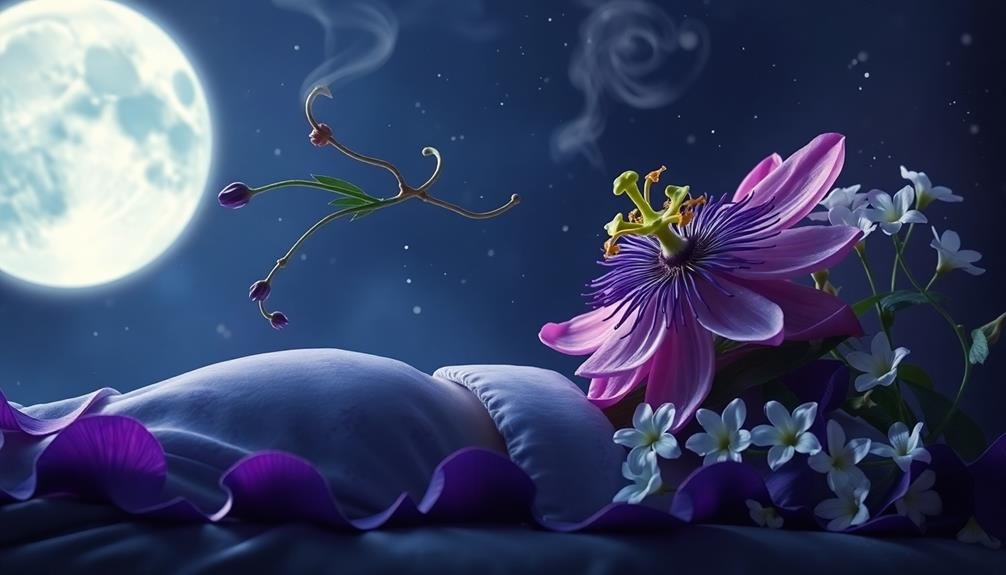
Why limit yourself to just valerian when seeking natural sleep aids? Passionflower can be an excellent companion to valerian for promoting better sleep. This herb has been used for centuries to treat anxiety and insomnia, making it a perfect match for valerian's sedative properties.
When combined, passionflower and valerian can enhance each other's effects, potentially leading to improved sleep quality and reduced anxiety. Here's a quick comparison of these two herbs:
| Aspect | Valerian | Passionflower |
|---|---|---|
| Primary Use | Sleep aid | Anxiety relief |
| Active Compounds | Valerenic acid | Flavonoids |
| Onset Time | 30-60 minutes | 20-30 minutes |
| Side Effects | Mild headache | Rare, minimal |
You'll find that passionflower can help you relax more quickly, while valerian works to deepen your sleep. This combination may be particularly effective if you struggle with racing thoughts or anxiety before bed. To use them together, try taking a standardized supplement or brewing a tea with both herbs about an hour before bedtime. Always consult with a healthcare professional before starting any new herbal regimen, especially if you're taking medications or have existing health conditions.
Hops for Enhanced Sleep Quality
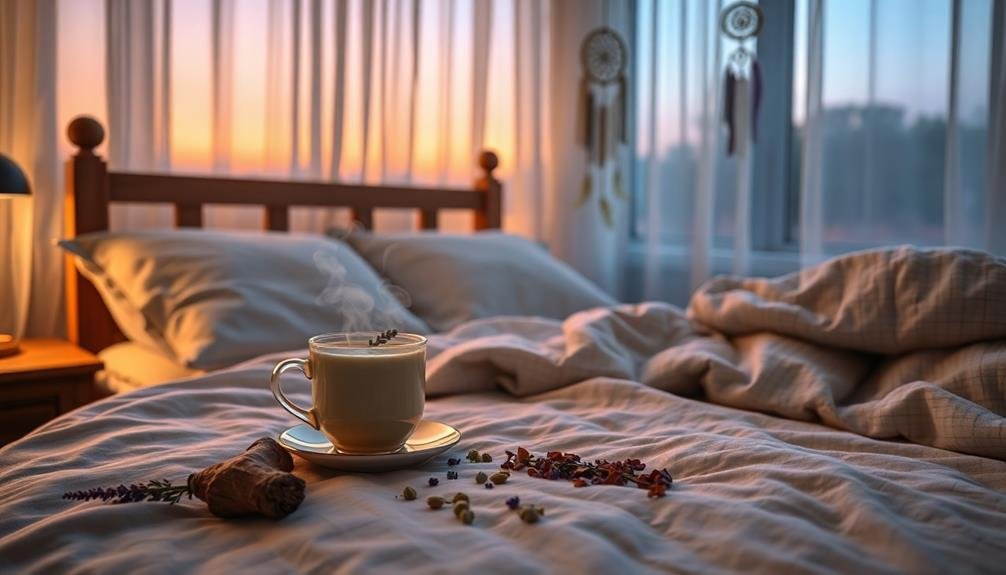
You'll find hops to be an excellent companion to valerian for improving sleep quality.
When combined, these herbs offer synergistic effects that enhance their individual sleep-inducing properties.
Hops activate GABA receptors in your brain, promoting relaxation and complementing valerian's sedative actions to help you achieve a more restful night's sleep.
Synergistic Sleep-Inducing Effects
Nature's sleep-inducing duo, valerian and hops, work together to enhance the quality of your slumber. When combined, these herbs create a powerful synergistic effect that can help you fall asleep faster and stay asleep longer.
Valerian root contains compounds that interact with GABA receptors in your brain, promoting relaxation and reducing anxiety. Hops, on the other hand, contain bitter resins and essential oils that have sedative properties.
By taking valerian and hops together, you're amplifying their individual benefits. The combination can help reduce the time it takes you to fall asleep, increase your total sleep time, and improve overall sleep quality.
This synergy is particularly beneficial if you struggle with insomnia or frequent night awakenings. Some studies have shown that the valerian-hops combination is as effective as certain prescription sleep medications, but without the risk of dependency or side effects.
To experience these synergistic effects, you can try taking a supplement that contains both herbs or brewing a tea using a blend of valerian root and hops.
Start with a low dose and gradually increase it as needed, always following the recommended guidelines on the product label.
GABA Receptor Activation
While the synergy between valerian and hops is impressive, hops alone can greatly enhance sleep quality through its interaction with GABA receptors. Hops contain compounds that bind to GABA receptors in your brain, promoting relaxation and reducing anxiety. This mechanism is similar to how some prescription sleep medications work, but without the potential for dependency.
When you combine hops with valerian, you're targeting multiple pathways to improve sleep. Hops enhance GABA activity, while valerian increases GABA production. This dual-action approach can lead to faster sleep onset and deeper, more restful sleep throughout the night.
Studies have shown that hops can:
- Reduce nighttime restlessness
- Decrease the time it takes to fall asleep
- Improve overall sleep quality
- Minimize daytime fatigue
You'll find hops in various forms, including teas, tinctures, and capsules. For best results, look for supplements that combine hops with valerian in a standardized formula.
Start with a low dose and gradually increase as needed, always following the manufacturer's recommendations. Remember, while hops and valerian are generally safe, it's wise to consult your healthcare provider before starting any new supplement regimen, especially if you're taking medications or have existing health conditions.
Complementary Sedative Properties
Three key sedative properties make hops an excellent complement to valerian for improved sleep quality.
First, hops contain xanthohumol, a compound that acts as a mild sedative and helps regulate sleep-wake cycles. This synergizes with valerian's effects on GABA receptors, potentially enhancing overall sleep quality.
Second, hops are rich in myrcene, a terpene with potent sedative properties. Myrcene can increase the effectiveness of valerian by promoting muscle relaxation and reducing anxiety. When combined, these herbs may help you fall asleep faster and experience fewer nighttime disturbances.
Lastly, hops contain alpha acids that have been shown to possess sleep-promoting effects. These acids work by increasing the production of melatonin, your body's natural sleep hormone. By pairing hops with valerian, you're likely to experience a more balanced and restful sleep.
When using hops and valerian together, you'll benefit from their complementary mechanisms of action. This combination can help address multiple aspects of sleep, including onset, duration, and overall quality.
Always consult with a healthcare professional before starting any new herbal regimen, especially if you're taking medications or have underlying health conditions.
California Poppy's Gentle Sedation
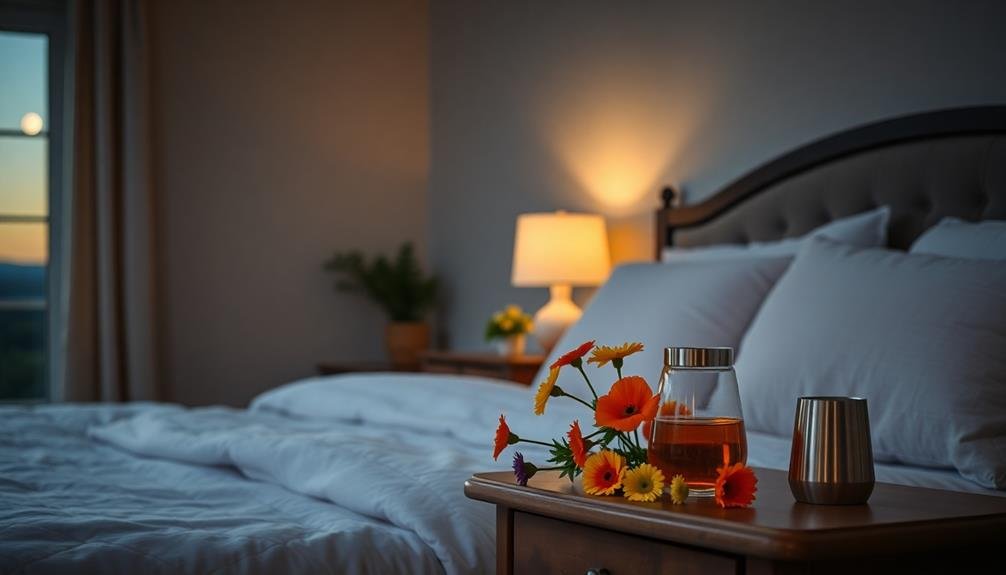
Harnessing the power of California poppy can help you achieve gentle sedation naturally. This herb, native to the western United States, has been used for centuries to promote relaxation and improve sleep quality.
When combined with valerian, California poppy enhances the overall sedative effect, making it an excellent choice for those seeking a more potent sleep aid.
California poppy works by interacting with GABA receptors in your brain, similar to valerian. This interaction helps calm your nervous system, easing anxiety and promoting a sense of tranquility.
Unlike some stronger sedatives, California poppy won't leave you feeling groggy or disoriented the next morning.
To incorporate California poppy into your sleep routine, consider trying it as a tea, tincture, or capsule. Start with a low dose and gradually increase as needed.
Remember, while herbs can be effective, it's crucial to consult with a healthcare professional before adding any new supplements to your regimen.
- Feel the gentle embrace of nature's calming touch
- Experience the blissful journey into peaceful slumber
- Awaken refreshed and ready to face the day
- Rediscover the joy of truly restful sleep
Skullcap's Nervous System Support
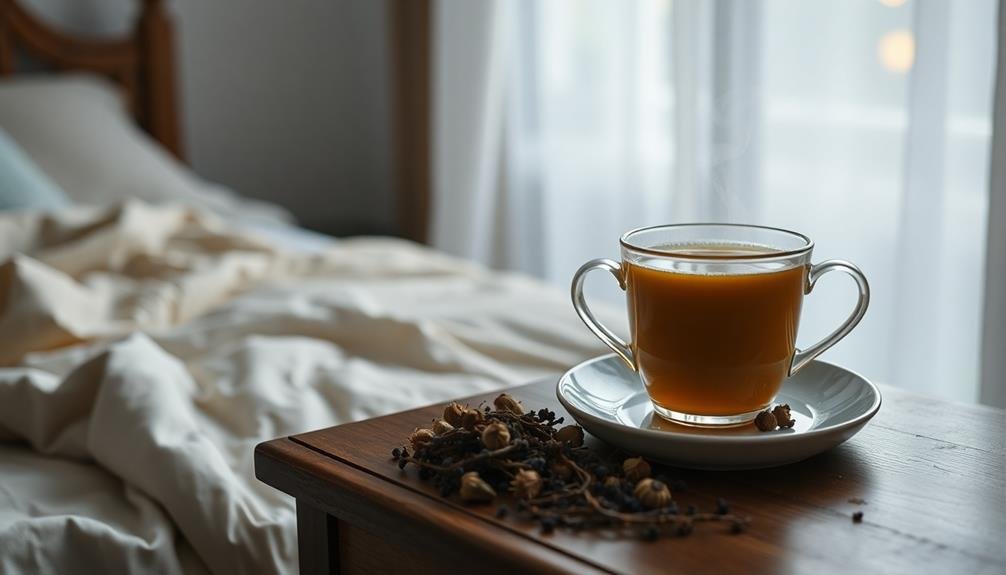
Skullcap offers potent support for your nervous system, helping to calm anxiety and stress.
You'll find this herb particularly effective at promoting a relaxation response in your body.
Calming Anxiety and Stress
With its long history in traditional medicine, skullcap has emerged as a powerful ally in calming anxiety and stress. This herb works by influencing your nervous system, helping to soothe frazzled nerves and promote a sense of calm.
When combined with valerian, skullcap can enhance your ability to relax and unwind, making it easier to fall asleep and stay asleep throughout the night.
You'll find that skullcap's anxiety-reducing properties can help you manage daily stressors more effectively. It's particularly useful for those moments when your mind feels overwhelmed or racing with thoughts.
By incorporating skullcap into your nightly routine, you're giving yourself a natural tool to combat tension and promote overall well-being.
- Feel the weight of anxiety lift from your shoulders
- Experience a sense of calm washing over your body
- Embrace the tranquility of a quiet mind
- Rediscover the joy of peaceful, restorative sleep
Regular use of skullcap alongside valerian can lead to improved sleep quality and a more balanced mood.
You'll likely notice a decrease in anxiety symptoms and an increased ability to cope with stress, both during the day and as you prepare for sleep.
Promoting Relaxation Response
Regularly, skullcap's impact on your nervous system extends beyond mere anxiety relief. This herb actively promotes a state of relaxation by interacting with your brain's GABA receptors, similar to valerian but through different mechanisms.
When combined with valerian, skullcap can enhance your body's natural relaxation response, making it easier to unwind and prepare for sleep. You'll find that skullcap helps calm racing thoughts and reduces muscle tension, complementing valerian's sedative effects.
This synergy can be particularly beneficial if you're dealing with stress-induced insomnia or restlessness. Skullcap also supports overall nervous system health, potentially improving your sleep quality over time.
To maximize skullcap's benefits, consider taking it in a tea or tincture form about an hour before bedtime. Start with a low dose and gradually increase as needed. You may notice improved sleep onset and duration, as well as a more refreshed feeling upon waking.
Magnolia Bark for Stress Relief
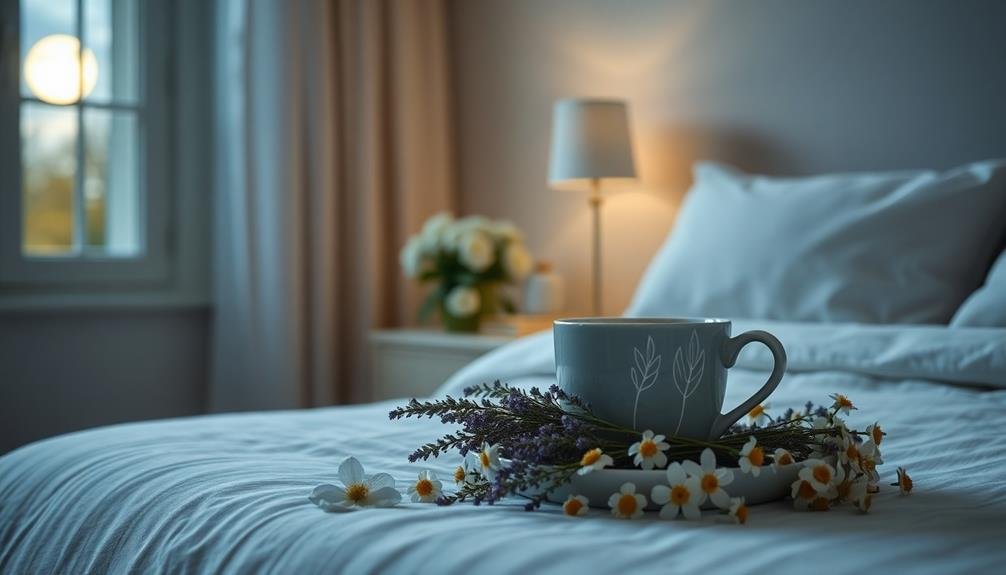
Nature's calming agents often come in unexpected forms, and magnolia bark is a prime example. This ancient Chinese remedy has been used for centuries to combat stress and anxiety.
When paired with valerian, magnolia bark can enhance your sleep quality by addressing the root cause of sleeplessness: stress.
Magnolia bark contains compounds called honokiol and magnolol, which have been shown to reduce cortisol levels and promote relaxation. These compounds work synergistically with valerian to create a powerful sleep-inducing combination.
You'll find that taking magnolia bark alongside valerian can help you fall asleep faster and experience more restful sleep throughout the night.
To make the most of this herbal duo, try taking them together about an hour before bedtime. You can find magnolia bark in supplement form or as a tea.
When combined with valerian, you may experience:
- A sense of calm washing over you
- Muscles relaxing, melting away tension
- Racing thoughts slowing down
- A gentle, natural shift into sleep
Ashwagandha's Adaptogenic Sleep Benefits
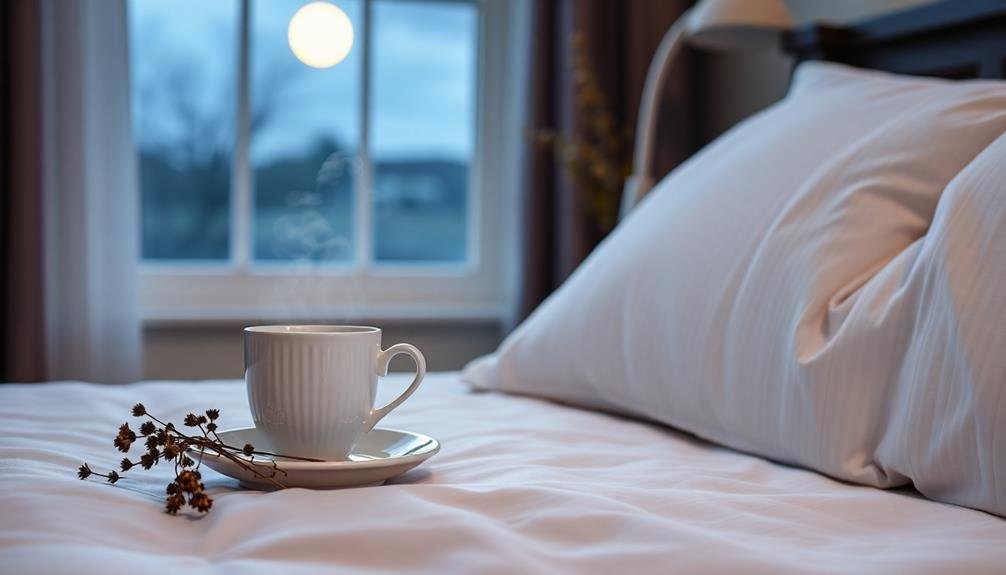
Ashwagandha, an ancient Ayurvedic herb, offers powerful adaptogenic benefits for sleep.
You'll experience reduced stress levels as this herb helps regulate cortisol, your body's primary stress hormone.
Stress Reduction Effects
One of the most potent adaptogenic herbs for sleep is Ashwagandha, known for its stress-reducing properties. When combined with valerian, it can greatly enhance your ability to unwind and fall asleep.
Ashwagandha works by lowering cortisol levels in your body, which helps combat the negative effects of chronic stress on your sleep patterns.
By incorporating Ashwagandha into your nightly routine, you'll likely experience:
- A sense of calm washing over you as you prepare for bed
- Reduced mental chatter and racing thoughts
- A noticeable decrease in physical tension and muscle aches
- A feeling of being grounded and centered, even amid life's chaos
This powerful herb not only helps you fall asleep faster but also improves the quality of your sleep.
It's particularly effective for those who struggle with anxiety-induced insomnia or stress-related sleep disturbances.
Ashwagandha's adaptogenic nature means it can help your body better cope with various stressors, both physical and mental.
Improved Sleep Quality
While Ashwagandha's stress-reducing effects are impressive, its ability to improve sleep quality is equally remarkable. This adaptogenic herb can help you achieve deeper, more restful sleep by addressing several key aspects of your sleep cycle.
Ashwagandha has been shown to increase the amount of time you spend in slow-wave sleep, also known as deep sleep. This stage is essential for physical restoration and memory consolidation. By enhancing slow-wave sleep, you'll wake up feeling more refreshed and cognitively sharp.
The herb also helps regulate your body's stress response system, which can often interfere with sleep. By lowering cortisol levels, Ashwagandha creates a more conducive environment for falling asleep and staying asleep throughout the night.
Additionally, Ashwagandha may improve sleep efficiency, meaning you'll spend more time actually sleeping while in bed. This can lead to fewer nighttime awakenings and a more continuous, uninterrupted sleep cycle.
When combined with Valerian, Ashwagandha's sleep-enhancing properties can be even more potent. The two herbs work synergistically to promote relaxation, reduce anxiety, and improve overall sleep quality, making them an excellent natural option for those struggling with sleep issues.
Holy Basil for Cortisol Regulation
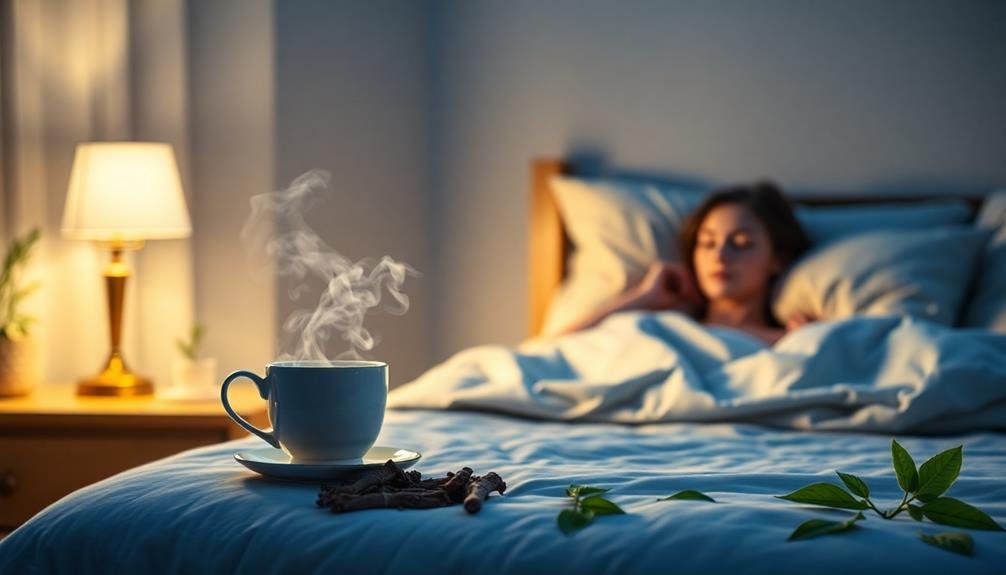
Holy basil, also known as Tulsi, stands out as a powerful adaptogen for regulating cortisol levels and promoting better sleep. When combined with valerian, it can create a synergistic effect that addresses both stress and sleep issues.
Holy basil works by lowering cortisol, the body's primary stress hormone, which often interferes with your ability to fall asleep and stay asleep throughout the night.
You'll find that incorporating holy basil into your sleep routine can help you:
- Feel more relaxed and at ease before bedtime
- Wake up feeling refreshed and energized
- Experience a sense of calm throughout the day
- Improve your overall stress resilience
To use holy basil with valerian, try taking it as a tea or supplement about an hour before bed. This combination can help reduce anxiety, calm your mind, and prepare your body for a restful night's sleep.
Catnip's Mild Sedative Properties
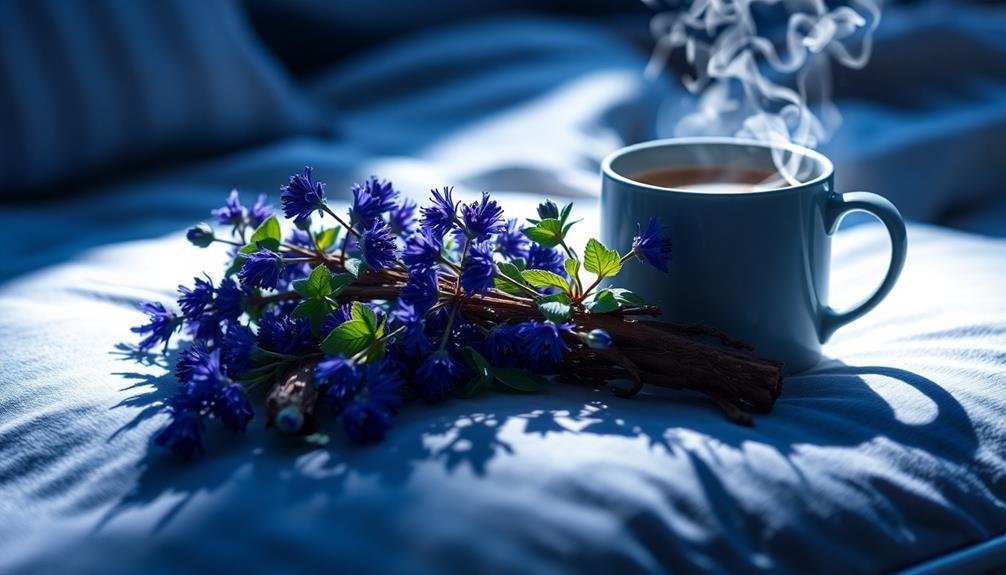
Moving from holy basil, let's explore another herb that can complement valerian for improved sleep: catnip. You might associate catnip with its effects on felines, but it's also beneficial for humans. This herb contains nepetalactone, a compound that acts as a mild sedative and can help you relax.
When paired with valerian, catnip can enhance its sleep-promoting properties. You'll find that this combination may help you fall asleep faster and experience a more restful night. Catnip's calming effects can also reduce anxiety and stress, which often contribute to sleep issues.
To use catnip for sleep, try brewing it as a tea. Steep 1-2 teaspoons of dried catnip in hot water for 10 minutes, then strain and drink about 30 minutes before bedtime. You can also find catnip in supplement form or as an essential oil for aromatherapy.
While catnip is generally safe, it's important to use it in moderation. Excessive consumption may cause headaches or nausea.
As with any herbal remedy, consult your healthcare provider before incorporating catnip into your sleep routine, especially if you're pregnant, nursing, or taking medications.
Linden Flower's Relaxing Effects
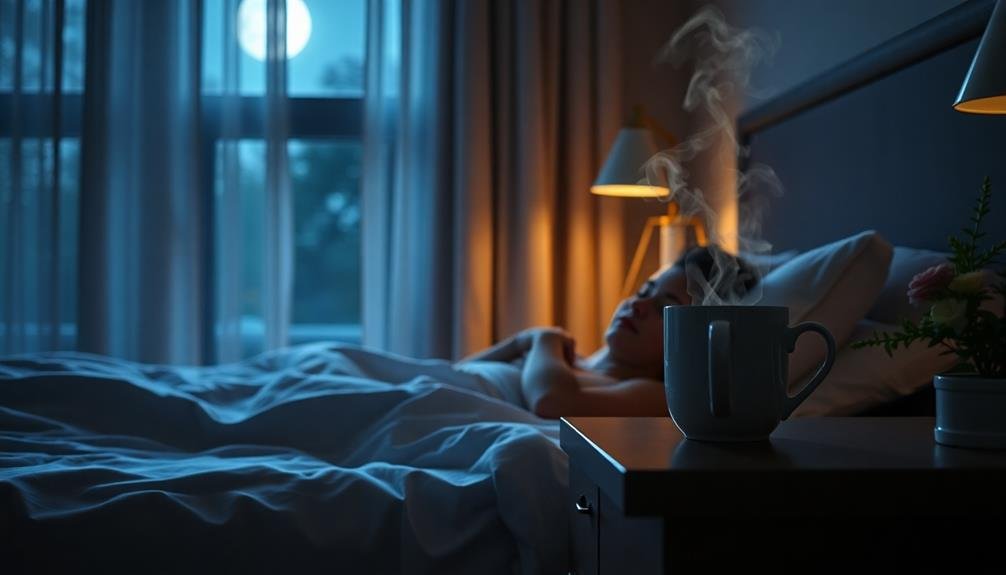
Another herb that pairs well with valerian for sleep is linden flower. This gentle, sweet-smelling herb has been used for centuries to promote relaxation and improve sleep quality. When combined with valerian, linden flower can enhance the overall sedative effect, helping you drift off to sleep more easily.
Linden flower works by calming your nervous system and reducing anxiety. It's known for its ability to lower blood pressure and heart rate, creating a sense of tranquility that's perfect for bedtime. You'll find that linden flower tea is particularly soothing, especially when consumed about an hour before you plan to sleep.
The combination of linden flower and valerian can be particularly effective if you're dealing with:
- Racing thoughts that keep you awake
- Tension headaches that interfere with sleep
- Mild anxiety that makes it hard to relax
- Physical restlessness at bedtime
When using linden flower with valerian, start with small doses and gradually increase as needed. You can find linden flower in various forms, including teas, tinctures, and capsules.
Always consult with a healthcare professional before adding new herbs to your sleep routine, especially if you're taking medications or have existing health conditions.
Valerian and St. John's Wort
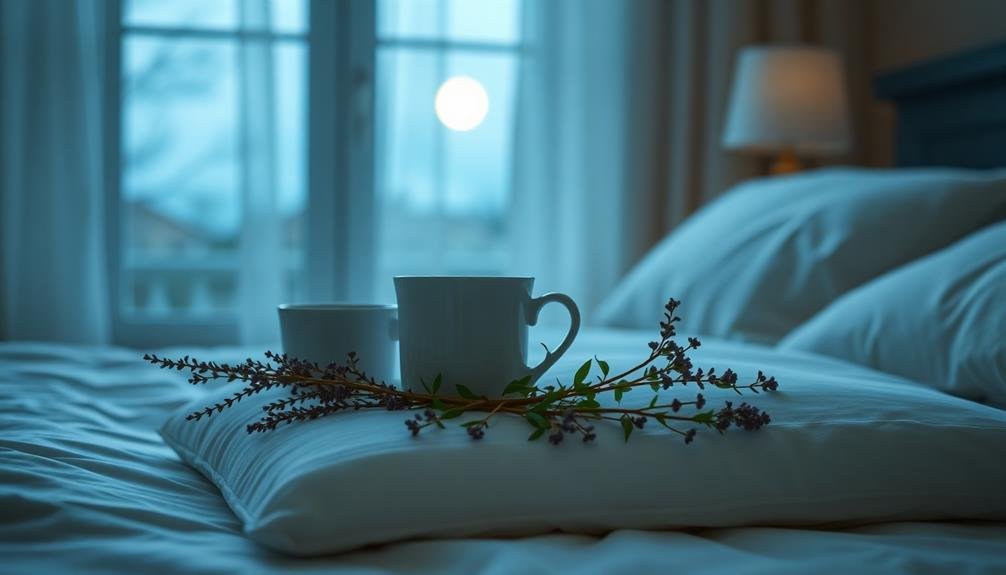
St. John's Wort is another popular herb often combined with valerian for sleep support. While valerian primarily addresses sleep onset and quality, St. John's Wort can help manage mood and anxiety, which often contribute to sleep issues.
When you pair these two herbs, you're targeting multiple aspects of sleep health. Valerian's sedative properties help you fall asleep faster and stay asleep longer, while St. John's Wort works to balance your mood and reduce stress levels. This combination can be particularly effective if you're experiencing sleep disturbances due to mild depression or anxiety.
It's important to note that St. John's Wort can interact with various medications, including antidepressants and birth control pills. Always consult your healthcare provider before combining these herbs, especially if you're taking other medications.
Start with low doses and monitor your body's response. Some people may experience vivid dreams or increased sensitivity to sunlight when using St. John's Wort.
For best results, take both herbs about an hour before bedtime. You can find them in various forms, including teas, tinctures, and capsules. Choose a high-quality product from a reputable source to guarantee potency and safety.
Kava Root for Deep Relaxation
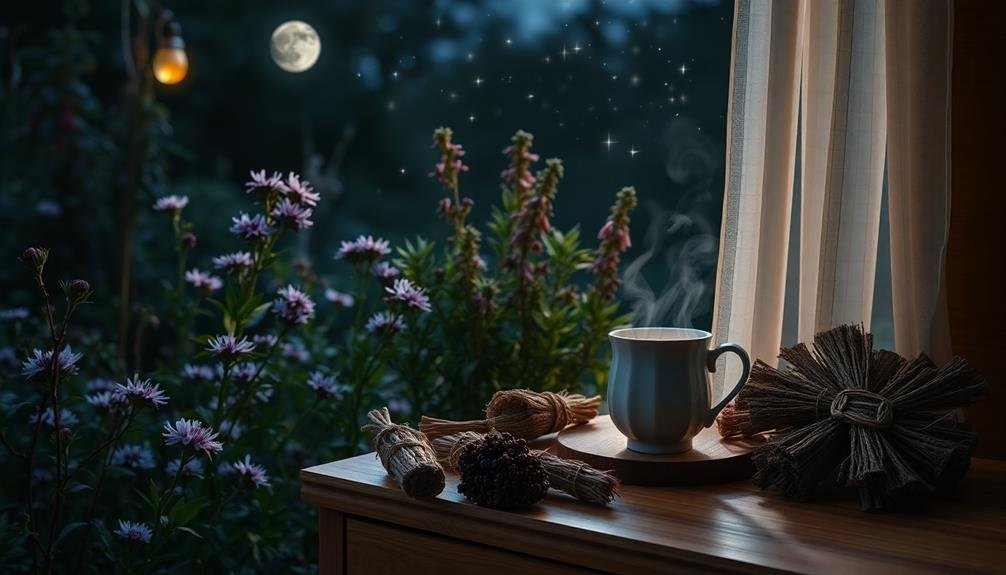
Kava root offers a unique approach to deep relaxation and improved sleep quality. When combined with valerian, it can enhance your overall sleep experience. Kava's active compounds, called kavalactones, interact with your brain's GABA receptors, promoting a sense of calm and reducing anxiety. This synergistic effect can help you drift off to sleep more easily and enjoy a more restful night.
You'll find that kava root not only aids in falling asleep but also improves sleep quality. It may help reduce nighttime awakenings and increase the amount of time you spend in deep, restorative sleep stages.
However, it's crucial to use kava responsibly and consult with a healthcare professional before adding it to your sleep regimen, especially if you're taking medications or have liver concerns.
When using kava root with valerian for sleep, you might experience:
- A profound sense of tranquility washing over you
- A gentle heaviness in your limbs, easing you into slumber
- A quieting of racing thoughts, allowing your mind to unwind
- A deep connection with your body's natural sleep rhythms
Remember to start with a low dose and gradually increase as needed. By combining kava root with valerian, you're creating a powerful natural sleep aid that can help you achieve the restful night you deserve.
Frequently Asked Questions
Can Valerian Root Interact With Prescription Sleep Medications?
Yes, valerian root can interact with prescription sleep medications. You shouldn't combine them without consulting your doctor. It's possible to experience increased drowsiness or other side effects. Always disclose all supplements you're taking to healthcare providers.
How Long Does It Take for Valerian and Herb Combinations to Work?
You'll typically notice the effects of valerian and herb combinations within 30 minutes to 2 hours. They work best when taken regularly over several weeks. Everyone's different, so it's important to be patient and consistent.
Are There Any Age Restrictions for Using Valerian and Herbal Sleep Aids?
You should consult a doctor before using valerian or herbal sleep aids, especially for children and seniors. There's no strict age limit, but it's not recommended for kids under 12. Always follow dosage instructions carefully.
Can Pregnant or Breastfeeding Women Safely Use Valerian and Herbal Sleep Combinations?
You should avoid using valerian and herbal sleep combinations if you're pregnant or breastfeeding. There's not enough research on their safety during these periods. Always consult your doctor before taking any supplements while pregnant or nursing.
What's the Best Way to Prepare Valerian and Herbal Sleep Teas?
To prepare valerian and herbal sleep teas, you'll want to steep 1-2 teaspoons of dried herbs in hot water for 10-15 minutes. Strain, add honey if desired, and enjoy 30-60 minutes before bedtime for best results.
In Summary
You've now explored a variety of herbs that pair well with valerian for improved sleep. Remember, everyone's body reacts differently, so you'll need to find what works best for you. Start with small doses and consult a healthcare professional before combining herbs. While these natural remedies can be effective, they're not a substitute for good sleep hygiene. Experiment safely, and you'll likely discover a blend that helps you drift off peacefully.

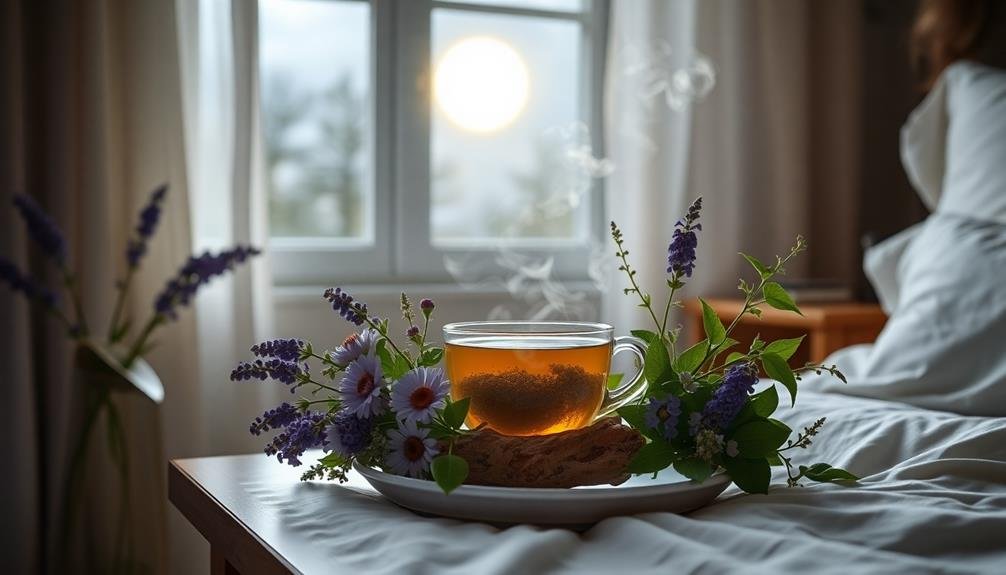



Leave a Reply